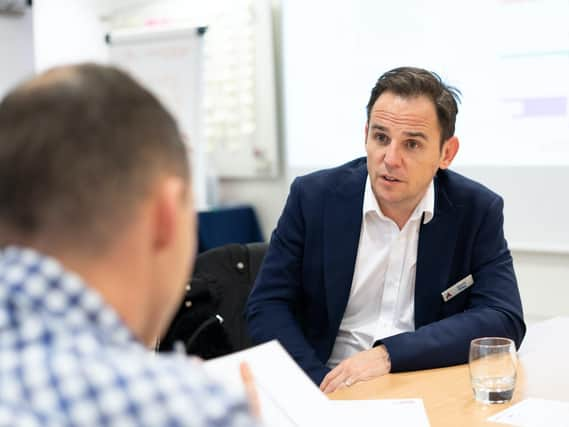Warwick business coach gives advice on how to find and keep the best employees


A Warwick business coach is giving advice to employers about how to find and keep the best staff.
Kevin Riley, at ActionCOACH Warwick has seen an increase of business owners in both the care and hospitality sectors looking for advice on how they can attract and retain great employees.
Advertisement
Hide AdAdvertisement
Hide AdHe said: "“First and foremost, business owners mustn’t rely on a recruitment agency and leave it there.
"It’s vital for business owners to understand that the responsibility for recruitment is in their hands and runs much deeper.
"Successful recruiting hinges on the existing culture of a business, a recruitment process that explores attitudes as well as skills, and having ongoing professional development opportunities for staff.
“Employee retention is a critical part of both the care and hospitality industries.
Advertisement
Hide AdAdvertisement
Hide Ad"Yet sadly, most business operators feel powerless in stopping the high staff turnover rate in the industry.
"I want to share how these businesses can stabilise employment, improve retention, and increase customer satisfaction and profitability.”
The points below provide an understanding of the industry and the steps taken to resolve these critical issues:
Focus on training: It’s not enough to train new employees by having them shadow staff for two days. Training needs to be done on a one-to-one continual basis. This approach results in consistent performance of employees allowing them to work more efficiently. Cross-training is equally important for your operations, not only because it can help with successful planning but also because it exposes team members to different areas of the job. When a member of staff feels confident in their role, it shines through to customers and bolsters team confidence too.
Advertisement
Hide AdAdvertisement
Hide AdFlexibility goes a long way: This is especially important to staff who have physically demanding roles - travelling from client to the next or on your feet all day in a kitchen. It’s important to be flexible with rotas for staff. For instance, how can you make your workplace more appealing to skilled people who also have family commitments? Having a diverse team will go a long way to finding the perfect workplace solution for everyone’s needs.
Workplace relationships: Co-worker relationships directly impact the turnover and retention in an establishment. Creating a happy environment will result in a better atmosphere in the workplace where employees then have a positive mindset to deal with any challenges thrown up by the complex factors of the hospitality and care sectors. What can you do to foster relationships both during work and socially?
Kevin said: “Organisations that show they care about their employees by providing a fun and inspiring workplace will reap enormous benefits from the increased productivity, efficiency and creative approach to problem-solving.
"The best way to reduce staff turnover is to eliminate the reasons why people leave. Whilst there is no one-size-fits-all solution because every organisation is different, the culture of your business is key to attracting and retaining talent,”
So, here are three steps to take right now:
Advertisement
Hide AdAdvertisement
Hide Ad1. Speak to your employees and find out what would make their working day better. This could help you identify simple things that can be fixed quickly, as well as give you a better understanding of problems that should be resolved immediately and over time.
2. Carry out research outside of your organisation – understand what other businesses are doing to keep their employees happier and more successful, whether it could be a more comfortable uniform or a training course to give more confidence.
3. Ensure your staff have regular opportunities to tell you how to improve productivity and effectiveness of what they do – who better to ask than the specialists you already employ?